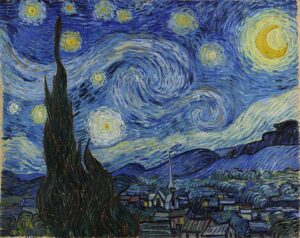 I would wager that unless you have read Michael Finkel’s excellent book The Art Thief, you’ve not encountered our November metaphor. Finkel tells the true story of Stéphane Bréitwieser, who amassed a collection of stolen art with an estimated value of two billion dollars. Instead of selling what he stole, the thief built what amounted to his own private gallery where he felt the works would be better appreciated than in a museum.
I would wager that unless you have read Michael Finkel’s excellent book The Art Thief, you’ve not encountered our November metaphor. Finkel tells the true story of Stéphane Bréitwieser, who amassed a collection of stolen art with an estimated value of two billion dollars. Instead of selling what he stole, the thief built what amounted to his own private gallery where he felt the works would be better appreciated than in a museum.
Bréitwieser would be so transported emotionally by certain priceless artwork that he’d be obsessed with owning it. Finkel and those experts he interviewed attribute this to Stendhal Syndrome; our Wikipedia page on the topic notes that rapid heartbeat, dizziness, hallucinations, even fainting can be symptoms. For Bréitwieser, he was so moved that he had to steal, and this of course led to his eventual arrest.
I tried to think hard about when such reactions occurred for me; perhaps seeing the Bosch paintings in the Prado for the first time in 1985. I have revisited them several times, and my reactions are still strong. I’d say the same for Van Gogh’s Starry Night. The writer Stendahl (Marie-Henri Beyle) was overcome by emotion when first visiting Florence’s Basilica of Santa Croce; others have fainted in museums or become dizzy; one person had a heart attack while viewing Botticelli’s The Birth of Venus.
We need a different term for what I experienced when I first saw sunset over the Wellsville Mountains in Utah; it was a euphoria that verged on mania, very different from the majestic serenity of catching that moment three times on the South Rim of the Grand Canyon in 2022.
The overwrought reactions of Stendhal Syndrome seem quite different from when a work of art, a landscape, or a piece of music bring us great joy or tears. So what works of art move you so deeply that you fear you might faint?
See you in the museum. The VMFA collection is varied and, in many spots, sublime (we need a Word-of-The-Week post for that term). With a little more time on my hands since switching to part-time work, I’ve increased both my reading as well as my museum visits. After reading about Bréitwieser, I’ll never look at artwork the same way again.
Send words and metaphors my way by e-mailing me (jessid -at- richmond -dot- edu) or leaving a comment below. Want to write a guest entry? Let me know!
See all of our Metaphors of the Month here and Words of the Week here.
Image Source: Wikipedia
Great article! I liked how it uses the metaphor of Stendhal syndrome to explore how art can sometimes trigger deep emotional responses — it made me reflect on my own experiences with powerful artworks. Thanks for sharing it.